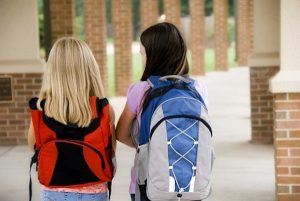No time to waste in getting kids ready for new school year
By Cathy Janek For Chronicle Media — August 13, 2016
Carrying around backpacks that are too heavy can lead to back problems and other health issues for kids. (Photo courtesy of National Safety Council)
School supplies stacked on store shelves and yellow buses out on subdivision streets practicing their new routes are just a couple of the tell-tale signs that many area schools will soon be opening their doors for another year of learning.
Throughout the state, many school districts will be resuming a new school year over the next two weeks.
Chicago Public Schools are one of a few districts who are remaining closed until after the Labor Day holiday. CPS school year runs Sept. 6 thru June 20, 2017.
After a summer of different sleep schedules and family eating patterns, getting the kids “back into the routine” can prove challenging.
Re-establishing routines prior to the official first day of school can be helpful getting kids adjusted, University of Illinois Extension’s Youth Development Educator Deanna Roby said.
Practicing getting up, getting dressed, and eating lunch and dinner at consistent times all help children get into the back to school mode, she added.
“Back to school also means more independence for kids,” Roby said. Before school official commences is a great opportunity for parents to build confidence in their children so that they can tackle the responsibilities that will be on their shoulders once the school year begins.”
First Day Jitters
If your child is facing first day jitters, the American Academy of Pediatrics encourages parents to remind their children that other children also are uneasy about the first day of school.
Also attending meet and greets and orientations can help kids and parents familiarize themselves with the teachers, the principal and the support staff, Roby said.
“When situations arise parents already know who to contact.”
Nutrition
Nutrition plays such a critical role not only in the academics, but also in the behavior of kids in school, University of Illinois Extension’s Nutrition Education Program educator Jessica Gadomski, a registered dietician, said.
Many research studies have shown a connection between a good diet, physical activities, and school performance, she added.
Much has changed in the area of foods served in schools based on the Healthy, Hunger-Free Kids Act which was established to make sure that kids have access to the nutrition that will help them grow.
Gadomski recommends families utilize the USDA’s MyPlate as a model for building healthy meals and snacks for not only kids, but the whole family.
Getting kids involved in the kitchen, choosing meal options, and taking kids to the grocery store can help engage them in their nutrition.
This allows kids to take ownership in making good, healthy choices, she added.
For school meals, Gadomski suggests studying school-provided lunch options online beforehand.
If packing a lunch, she suggests adding ice packs to keep lunch items cool, Gadomski said.
She recommends cutting and prepping items in advance so that children can grab their snacks in the morning and have enough time to eat their lunch and socialize with their classmates.
A whole orange can end up in the garbage can uneaten because kids don’t have the time to peel the orange.
In her own family, she uses Sundays to prep fruit and vegetables for the packed lunches and snacks for the week.

Parents are encouraged to take time before the new school year begins to teach their children about good nutrition choices for their lunches and snacks. (Photo courtesy of University of Illinois Extension)
In our country, Gadomski said, one-third of children are considered overweight. We want to promote not only healthy nutrition, but also healthy weight.
Backpack Safety
Dr. Anisha Shetty, a Pediatrician with Advocate Health Care, said backpacks should never weigh more than 10 to 20 percent of a child’s body weight.
Picking a backpack that is lightweight with many compartments to help distribute the weight can be helpful, she added. Also backpacks should be worn using both shoulder straps which should be padded.
An overweight backpack or one that is not worn properly can lead to back problems, Shetty said.
Sleep
In the summer kids tend to stay up later and/or sleep later in the morning.
As a result, Shetty recommends easing kids back into a sleep schedule beginning about two weeks before school starts.
Each night, she recommends moving kids’ bedtimes slightly about 15 minutes earlier each night and waking them up 15 minutes earlier until they are back on their schedule, which should be maintained during the week and on weekends.
In addition to getting the appropriate amount of sleep which can vary between ten to 13 hours for children ages 3 to 5, nine to 12 hours for ages 6 to 12 years, and eight to 10 hours for teens. Shetty said the quality of sleep is also important.
She promotes “sleep hygiene” for the entire family, which includes putting away any electronics such as phones and tablets, taking a warm bath, and beginning to unwind about an hour prior to bedtime.
For teens, not sleeping well can lead to accidents as well as obesity and hypertension, Shetty said. “Getting the appropriate number of hours of sleep can help students focus better,” she said.
She also recommends children see their doctors once a year for an annual physical—even though school physicals are only required for students entering kindergarten or first grade, sixth grade, and ninth grade.
“We can make sure that they are growing well and hitting those milestones,” Shetty added.
— No time to waste in getting kids ready for new school year —








